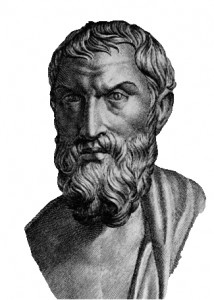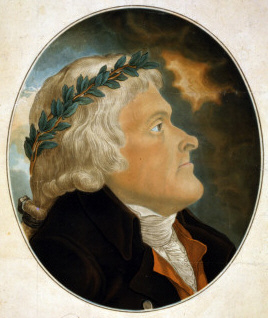Peace and Safety For Your November 20th – The Truth About Jefferson and Stoicism
 Peace and Safety to the Epicureans of today, no matter where you might be!
Peace and Safety to the Epicureans of today, no matter where you might be!
On this Twentieth of November, I want to comment on a blog post that is unhappy and thus a poor choice for our Twentieth remembrance, but it is so egregiously wrong that I can’t avoid it.
As a further indication (as if you needed more) of the decline in educational standards in the United States, I offer you a new post entitled “The Importance of Marcus Tullius Cicero” at the aptly titled “theimaginativeconservative.org.”
This otherwise lengthy article woefully fails to acknowledge Thomas Jefferson’s true views on Cicero, Plato, and Stoicism. In fact, it goes so far as to imply that Jefferson held pro-Stoic views totally the opposite of those Jefferson really held!
I do not think it is a good use of time to enter online debates with Conservative, Libertarian, or Objectivist bloggers, even when their scholarship sinks as low as this. Such back-and-forth with people whose minds are sunk in opposing views is largely a waste of time, and there is much more important work to do to bring the truth about Epicurus to those whose minds are open enough to receive it.
But apparently the curriculum at Hillsdale College, which prides itself on classical scholarship, is too shallow to acknowledge Jefferson’s true views. And thus Hillsdale leads a new generation astray, burying the true views of Jefferson along with even the knowledge of Epicurus’ existence.
Perhaps a few students at Hillsdale will happen upon blog entries like this one, or even simply happen in their own reading to come across Jefferson’s private letters. In either case, they will need the courage to face for themselves that what they have been taught about Jefferson and Epicurus and Cicero and Plato is tragically wrong. One can hope that at least some of them will find the truth, however, and escape the siren song of the Academy that continues to deceive for generation after generation! If they would only listen to Jefferson!
For those who may come across this who seek the truth, there are two of Jefferson’s letters in particular with which to start:
Thomas Jefferson to William Short, October 31, 1819
As you say of yourself, I too am an Epicurean. I consider the genuine (not the imputed) doctrines of Epicurus as containing everything rational in moral philosophy which Greece and Rome have left us. Epictetus indeed, has given us what was good of the stoics; all beyond, of their dogmas, being hypocrisy and grimace. Their great crime was in their calumnies of Epicurus and misrepresentations of his doctrines; in which we lament to see the candid character of Cicero engaging as an accomplice. Diffuse, vapid, rhetorical, but enchanting. His prototype Plato, eloquent as himself, dealing out mysticisms incomprehensible to the human mind, has been deified by certain sects usurping the name of Christians; because, in his foggy conceptions, they found a basis of impenetrable darkness whereon to rear fabrications as delirious, of their own invention. These they fathered blasphemously on him who they claimed as their founder, but who would disclaim them with the indignation which their caricatures of his religion so justly excite. Of Socrates we have nothing genuine but in the Memorabilia of Xenophon; for Plato makes him one of his Collocutors merely to cover his own whimsies under the mantle of his name; a liberty of which we are told Socrates himself complained. Seneca is indeed a fine moralist, disguising his work at times with some Stoicisms, and affecting too much of antithesis and point, yet giving us on the whole a great deal of sound and practical morality.
Thomas Jefferson to John Adams, July 5, 1814:
I am just returned from one of my long absences, having been at my other home for five weeks past. Having more leisure there than here for reading, I amused myself with reading seriously Plato’s Republic. I am wrong, however, in calling it amusement, for it was the heaviest task-work I ever went through. I had occasionally before taken up some of his other works, but scarcely ever had patience to go through a whole dialogue. While wading through the whimsies, the puerilities, and unintelligible jargon of this work, I laid it down often to ask myself how it could have been, that the world should have so long consented to give reputation to such nonsense as this? How the soi-disant Christian world, indeed, should have done it, is a piece of historical curiosity. But how could the Roman good sense do it? And particularly, how could Cicero bestow such eulogies on Plato! Although Cicero did not wield the dense logic of Demosthenes, yet he was able, learned, laborious, practised in the business of the world, and honest. He could not be the dupe of mere style, of which he was himself the first master in the world. With the moderns, I think, it is rather a matter of fashion and authority. Education is chiefly in the hands of persons who, from their profession, have an interest in the reputation and the dreams of Plato. They give the tone while at school, and few in their after years have occasion to revise their college opinions. But fashion and authority apart, and bringing Plato to the test of reason, take from him his sophisms, futilities and incomprehensibilities, and what remains? In truth, he is one of the race of genuine sophists, who has escaped the oblivion of his brethren, first, by the elegance of his diction, but chiefly, by the adoption and incorporation of his whimsies into the body of artificial Christianity. His foggy mind is forever presenting the semblances of objects which, half seen through a mist, can be defined neither in form nor dimensions. Yet this, which should have consigned him to early oblivion, really procured him immortality of fame and reverence.
The Christian priesthood, finding the doctrines of Christ levelled to every understanding, and too plain to need explanation, saw in the mysticism of Plato, materials with which they might build up an artificial system, which might, from its indistinctness, admit everlasting controversy, give employment for their order, and introduce it to profit, power and pre-eminence. The doctrines which flowed from the lips of Jesus himself are within the comprehension of a child; but thousands of volumes have not yet explained the Platonisms engrafted on them; and for this obvious reason, that nonsense can never be explained. Their purposes, however, are answered. Plato is canonized; and it is now deemed as impious to question his merits as those of an Apostle of Jesus. He is peculiarly appealed to as an advocate of the immortality of the soul; and yet I will venture to say, that were there no better arguments than his in proof of it, not a man in the world would believe it. It is fortunate for us, that Platonic republicanism has not obtained the same favor as Platonic Christianity; or we should now have been all living, men, women and children, pell mell together, like beasts of the field or forest. Yet “Plato is a great philosopher,” said La Fontaine. But, says Fontenelle, “Do you find his ideas very clear?” “Oh no! he is of an obscurity impenetrable.” “Do you not find him full of contradictions?” “Certainly,” replied La Fontaine, “he is but a sophist.” Yet immediately after he exclaims again, “Oh, Plato was a great philosopher.” Socrates had reason, indeed, to complain of the misrepresentations of Plato; for in truth, his dialogues are libels on Socrates.
I have collected other quotations from Jefferson here.
Can the statements in these letters be reconciled with the statements at TheImaginativeConservative.org? No? Well, don’t hold your breath waiting for a correction. It’s just another day in the Platonic Paradise which is modern American Academia – even at Hillsdale College!
_____________
As Seneca recorded: Sic fac omnia tamquam spectet Epicurus! So do all things as though watching were Epicurus!
And as Philodemus wrote: “I will be faithful to Epicurus, according to whom it has been my choice to live.“

